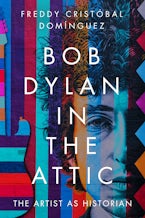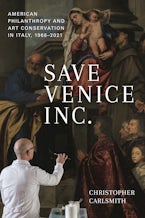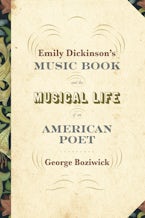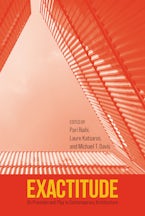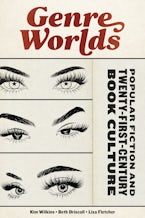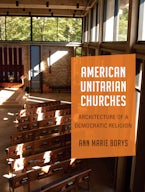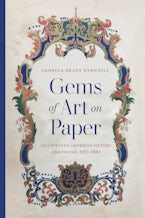- Home
- Through an Uncommon Lens
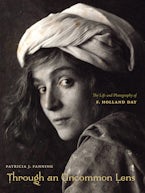
Through an Uncommon Lens
The Life and Photography of F. Holland Day
Published by: University of Massachusetts Press
304 Pages, x 1.10 in, 76 b&w, 31 duotones
Other Retailers:
Based in the Boston area, F. Holland Day (1864–1933) was a central figure in artistic circles on both sides of the Atlantic. Publisher of Oscar Wilde and Stephen Crane, mentor to a young Kahlil Gibran, adviser and friend to photographers Alvin Langdon Coburn and Edward Steichen, Day lived a life devoted to art and beauty. At the turn of the twentieth century, his reputation rivaled that of Alfred Stieglitz. A pioneer in the field of pictorial photography, Day was also an influential book publisher in the Arts and Crafts tradition. He cofounded the publishing company of Copeland and Day, which issued more than a hundred titles between 1893 and 1899. In addition, he embraced a unique sense of social responsibility and a commitment to historic preservation. Colorful and sometimes eccentric, Day was best known for his stunningly original, brilliantly executed, and sometimes controversial photographic images of blacks, children, and allegorical subjects. His determination to promote photography as a fine art led him to create photographic representations of the crucifixion of Christ, studies for which he was his own model. Although he continued to mentor young artists until his death, ill health caused Day to spend the last fourteen years of his life inside his home in Norwood, Massachusetts. By the time he died in 1933, he was virtually unknown, but in recent years there has been a resurgence of interest in his art. Responding to this renewed interest, Patricia Fanning has written an impressive biography—one that draws on previously unavailable archival material and is attuned to the historical and cultural contexts in which Day lived and worked. The book is illustrated with more than a hundred photographs, including 32 duotone illustrations of the artist's work.
Patricia J. Fanning is associate professor of sociology at Bridgewater State College and archivist of the Day Collection at the Norwood Historical Society.
"A valuable biography of a man who was significant in a number of ways—New England cultural history, the history of fine art publishing, the history of the American Arts and Crafts movement, and most notably the history of American photography."—Maureen Meister, author of Architecture and the Arts-and-Crafts Movement in Boston: Harvard's H. Langford Warren
"Fanning's extensive historical research and attention to detail makes her book required reading for anyone interested in the artist. . . . I highly recommend it."—Kristin Schwain, University of Missouri–Columbia
"Pioneering photographer, book publisher, and friend to a generatoin of artists and writers beginning in the 1890's, F. Holland Day has not until recently received the respect he deserves. . . . But [Fanning's] new book finally does justice to Day's achievement."—The Gay and Lesbian Review
"Day gave much-needed support to struggling artists, and on his death left his home to the village of Norwood, Massachusetts. . . . [I]t houses the historical society and Day's papers, which author Patricia Fanning . . . has minded to produce this necessary and informative biography, written in an easy, enjoyable style."—Style 1900 Magazine
"Ask anyone with a slight knowledge of the history of photography for their comments on Day and apart from blank responses you will probably hear words such as 'dilettante,' 'dabbler,' 'religious crank,' 'erotic oddball,' and so on. In truth, none of these words or phrases apply to Fred Holland Day; he was the exact opposite. . . . If Patricia Fanning had done nothing more than set the record straight on this account, then Through an Uncommon Lens would have done the world of photohistory a great service. However, in presenting us with her carefully researched and skillfully written account of Day's life she has done much more. . . . I would wholeheartedly recommend it to anyone with an interest in photography or humanity, but preferably both."—The Royal Photographic Society
"An unjustly forgotten late-19th century photographer 'distinctive for his theatrical costuming, complex symbolism, near-mystical allegories, and skillful manipulation of light, shade, and skin tone,' Fred Holland Day is supposedly receiving renewed interest; if not, this thorough, absorbing life-and-times-with photographs-will help. Day was born in 1864 in Norwood, Mass., a Boston suburb from which he didn't stray far, and only to find himself enveloped in the intellectual and artistic cliques of the day. Born to Universalist parents, he brought his powerful faith to the art and the artistic scene, helping those around him and mentoring young artists: "As installer of small displays in his studio, as a jury member for local and regional photo club exhibitions, as a lecturer, mentor, and advocate, Day began to make his mark quietly." In addition, he co-founded a publishing firm, Copeland and Day, which published works by authors including Stephen Crane and Oscar Wilde. The history of the Boston area in the late nineteenth to early twentieth century is entwined in Day's life; with plenty of recognizable turn-of-the-century personalities and an eclectic sample of work from Day and his contemporaries, this makes a satisfying read for photographers, and in particular fans of the Arts and Crafts movement."—Publishers Weekly
"Necessary and informative biography, written in an easy, enjoyable style."—Bibliofile



